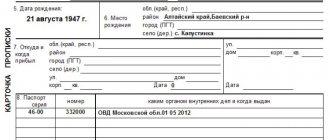According to the Constitution of the Russian Federation, every citizen has the right to free movement throughout the country. No one is forbidden to change their place of residence at their own request or move for permanent residence to another city or region. However, each person is obliged to notify the competent government authorities of a change of residence. If the registration address does not coincide with the actual residence of the person, this must be reported in accordance with the established procedure to the services involved in registering citizens.
Difference of concepts
The need to record location is due to the observance of law and order and the performance of duties on the part of both citizens and the state. The Civil Code of the Russian Federation obliges people to register in their own interests. After all, if the actual population in a city does not coincide with the official number of people based on the census, this can lead to problems in the administrative, housing, electoral and other aspects of the law of such a region.
For example, unregistered citizens living in the city are legally unable to vote in elections. In medical institutions, the number of beds and medical personnel will also not correspond to the actual workload. This is why every citizen must indicate their location to the passport and visa service when moving to another region or city.
Unfortunately, not all residents show responsibility and come to the Department of Migration Affairs of the Ministry of Internal Affairs (the department for migration issues, which replaced the FMS) to register. And this is largely due to confusion in concepts.
Registration address (official registration) - permanent place of residence, which is placed on the fifth page of the passport in the form of a stamp. The Civil Code distinguishes three main terms relating to the dislocation of people and assigning it to certain territorial bodies:
- registration address;
- place of residence;
- place of residence.
Often the address in passports does not coincide with the registration address where citizens live. In this case, the wording “place of residence” or “place of stay” is suitable. How to understand these concepts in practice? Let's give a few simple examples.
This is interesting: Where to get it, who issues it and when is Form 3 of the certificate of registration at the place of residence needed?
What is a place of registration
Legal registration of citizens is registration, which is indicated in the passport as permanent place of residence. As a rule, it is obtained as a result of the privatization of municipal apartments, when purchasing housing on the primary or secondary market. Most citizens receive initial registration in their parents' home. If a person does not move, then the address indicated in the passport coincides with the place of residence. In this case, the law requiring citizens to live at the place of registration (RF Government Decree No. 713) is observed.
Nuances of the concept of “place of residence”
When a person leaves the apartment or house in which he was originally registered, the new point of location is considered to be his place of residence. If a citizen settles at such an address, then he is obliged to record this fact by reporting this residential address to the territorial passport and visa service. For example, a girl got married or a young man got married and moved to live with his husband in another city. At the same time, he (she) cannot do without registering at a new location.
If a husband or wife registers their spouse in their apartment, then we will again be talking about official registration. To do this, it is necessary to deregister at the territorial office of the UMV at the place of residence by putting the appropriate stamp in the passport.
What is a place of residence
If a citizen moves to a different address due to the performance of official, military and other duties for a short period of time, then his deployment qualifies as a place of stay. This means a short-term change of place of residence, after which the person is expected to return to the address indicated during state registration as the main place of residence. For example, when sending employees to another city, the employing company temporarily rents apartments for their accommodation for 2 months. In this case, you need to register temporarily at the passport office.
This is interesting: Procedure for registration at the place of stay: rules, deadlines
What is place of residence
Every capable citizen of the Russian Federation chooses his place of residence at his own discretion. Free choice of place of residence is one of the most important human rights provided for by international agreements and Article 27 of the Constitution of the Russian Federation. Article 150 of the Civil Code of the Russian Federation (hereinafter referred to as the Civil Code) establishes that the right to choose a place of residence as an intangible benefit belonging to a citizen is protected by law.
In Russian legal acts, place of residence is understood as:
- the place where the citizen permanently or primarily resides (clause 1 of Article 20 of the Civil Code of the Russian Federation);
- residential building, apartment, service residential premises, specialized house, as well as other residential premises in which a citizen permanently or primarily resides as the owner, under a tenancy agreement, lease agreement or on other grounds provided for by the legislation of the Russian Federation (Article 2 of the Law of the Russian Federation dated 25 June 1993 No. 5242-1 “On the right of citizens of the Russian Federation to freedom of movement, choice of place of stay and residence within the Russian Federation” (hereinafter referred to as the Law of the Russian Federation of June 25, 1993 No. 5242-1);
- is a residential building, apartment, room, residential premises of a specialized housing stock (service residential premises, residential premises in a dormitory, residential premises of a mobile fund, residential premises in a building of a social service system, etc.) or other residential premises in which a citizen is permanently or primarily lives as an owner, under a lease (sublease), a lease agreement for specialized residential premises, or on other grounds provided for by the legislation of the Russian Federation, and in which he is registered at the place of residence (paragraph 2 of clause 3 of the Rules for registration and deregistration of citizens of the Russian Federation at the place of stay and place of residence within the Russian Federation, approved by Decree of the Government of the Russian Federation of July 17, 1995 No. 713, hereinafter referred to as the Registration Rules).
Thus, when characterizing the concept of “place of residence,” the legislator identifies three elements, according to which the location of a citizen can be recognized as a place of residence:
- status of the premises (residential building, apartment, service residential premises, specialized house (dormitory, hotel-shelter, house of flexible fund, special home for single elderly people, boarding house for the disabled), as well as other residential premises);
- period of residence: permanently or predominantly (temporarily);
- grounds for residence (for example, as an owner, under a lease (sublease), lease, etc.).
However, permanent residence does not mean long-term residence as one of the mandatory conditions. It is important that, due to the prevailing conditions, the citizen settles in a given place.
For some categories of citizens, a legal place of residence, i.e. determined by the law itself, is provided:
- Place of residence of minors under 14 years of age, the place of residence of their parents, adoptive parents or guardians is recognized (clause 2 of article 20 of the Civil Code).
If parents or adoptive parents live in different places, the place of residence of their children under the age of 14 will be the place of residence of the parent (adoptive parents) with whom the children live.
- The place of residence of incapacitated citizens under guardianship is considered to be the place of residence of their guardians.
Permanent registration and ownership
A change of residence address does not affect property rights. A citizen may have a residence permit in an apartment that he bought, received as a gift or as an inheritance. But he also has the right to move to another place, changing his registration address at will. This does not imply the alienation of the apartment: the person remains its legal owner and has the right to rent it out to others.
Permanent registration is the same as the place of official registration.
If we are talking about a person registered in an apartment, but who is not its full or shared owner, then in some cases he may be deregistered:
- in case of long-term absence from the place of registration;
- due to failure to fulfill financial obligations (non-payment of utility bills);
- due to systematic violation of the rights of other tenants, housing complexes, etc.
It is impossible to write out the owner of the property without his knowledge.
Place of actual residence
The place of actual residence is the housing in which a person stays temporarily. Under these conditions, a person can only have temporary registration or no registration at all. The actual residence of citizens is confirmed by documents, for example, a lease agreement.
Address of registration and actual residence - what is the difference?
Registration address is the housing where the citizen is registered. The person informs the state where he lives. Registration is the responsibility of citizens; a mark indicating its presence is placed in the passport.
If the registration does not coincide with the actual address, then it is imperative to inform the government authorities, since a person who does not have registration at the place of residence does not have the right to take part in elections or be assigned to a school or medical institution.
To register, you should contact the migration service and provide: an application, a passport, as well as a document giving the right to a person to live in a specific place (for example, a rental agreement).
The application for registration includes the following information:
- FULL NAME.
- Date of Birth.
- Citizenship.
- Passport.
- The address where registration is planned.
- Documents proving the citizen's right to the object.
- The address at which the citizen was previously registered.
Read more: People may have incomplete partial legal capacity
The package of documents can be brought in person or sent by mail .
The address of a citizen’s actual place of residence is the address at which you actually live, and not formally on paper.
Attention! You have 7 days to register at your place of residence. Otherwise, you will have to pay a fine in the amount of 2000 - 3000 thousand rubles.
Where is temporary registration recorded?
Temporary registration differs from permanent registration in that it is not indicated in the citizen’s passport. A person is issued a registration certificate in accordance with the registration regulations at the place of stay and place of residence (form No. 3 and 8, respectively). To receive such a document, you simply need to tell the employee the address where you will temporarily reside. Representatives of the Ministry of Internal Affairs have the right to check it by paying a visit or entrusting this task to a local police officer.
This is interesting: How many people can be registered in an apartment by law?
Residence address
However, such a rule does not mean that a person must be deregistered and receive a new registration stamp every time he leaves home. The current legislation of the Russian Federation allows a citizen to stay in another locality for a period of up to 90 days, during which he does not need to register at a new address.
If your stay in a new place is prolonged, in order to avoid conflicts with the law, it makes sense to issue a so-called temporary registration, which is also called registration at the place of stay. It is necessary if the citizen’s permanent registration address and the address of his actual place of residence do not coincide. To obtain it, you also need to contact the territorial office of the Federal Migration Service, providing documents confirming the existence of grounds for obtaining temporary registration, for example, such a basis could be a rental agreement.
Read more: Administrative law regulates relations between
Thus, if the address of your actual residence differs from the address of permanent registration, you should register at your place of residence. In addition to the absence of difficulties when communicating with inspection authorities, it will provide the opportunity to use the social infrastructure of the locality where you live, for example, to visit a clinic.
Theoretically, it is possible to live at a place of temporary residence without any documents: people often do this when they go to work in other regions and maintain a permanent address in their hometown. However, such a situation can create many problems for a person who does not have legal grounds to live in a new place.
Often the actual residential address and the registered address at the place of residence differ. It is very important to understand how the concepts under consideration differ and how they are similar. What is it - the actual address of residence and the address of registration, how the above terms are characterized, what are their features - we will look at all this in the article. This is necessary in order to avoid misunderstandings in the future, since citizens face an administrative fine for violating registration rules.
Dear readers! Our articles talk about typical ways to resolve legal issues, but each case is unique.
If you want to find out how to solve your particular problem, please use the online consultant form on the right or call. It's fast and free!
When do you need to confirm your actual address?
A person’s residence at an address, whether or not it coincides with registration, in some cases needs to be confirmed or refuted. Formally, the official residence of a person in the occupied living space requires him to bear certain obligations: payment of utility bills, for rent under a contract.
Often, the address of a person’s actual residence needs to be confirmed in order to bring him to administrative or criminal liability. For example, a bank debtor or a person evading payment of alimony. To confirm actual residence, testimony from neighbors, colleagues from work, a local police officer, etc. is used.








